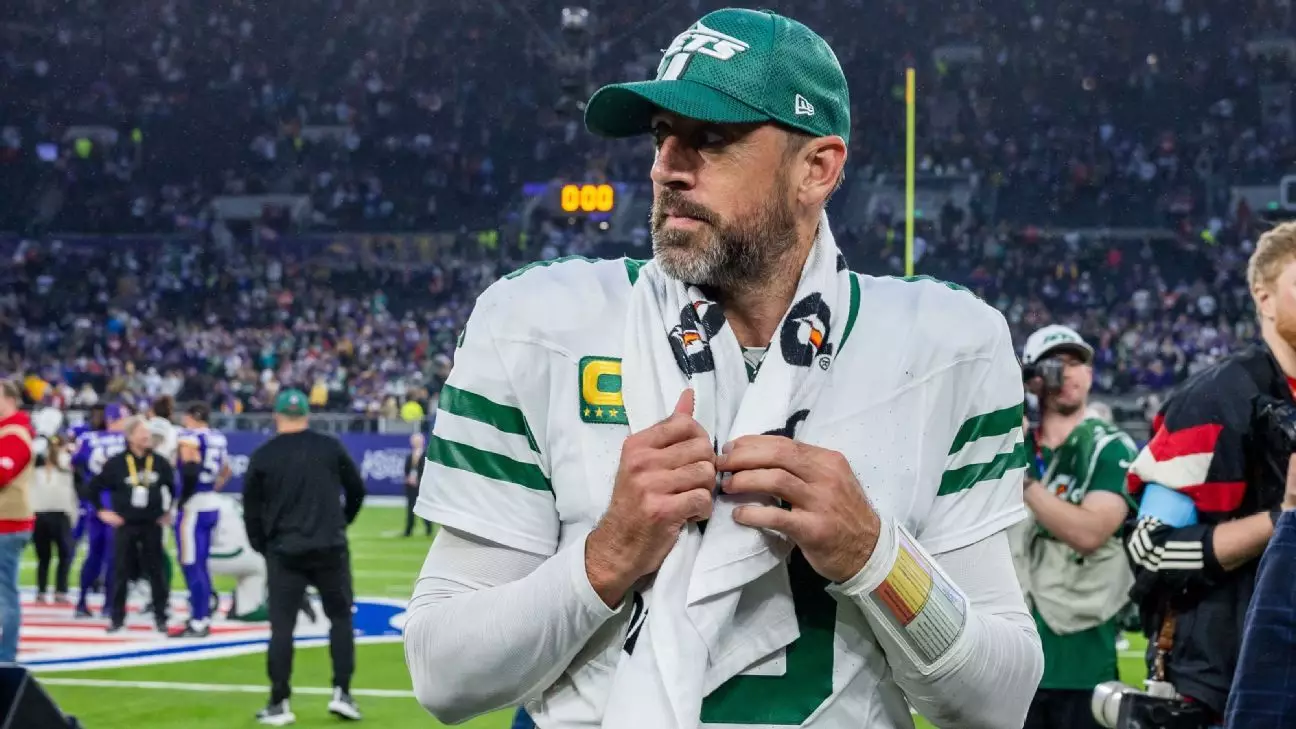The New York Jets have found themselves engulfed in a wave of upheaval following the surprising firing of head coach Robert Saleh. Amidst this turbulence, quarterback Aaron Rodgers has taken center stage in discussions surrounding the franchise’s future direction. This dramatic pivot comes just five games into the season, raising eyebrows and igniting controversy regarding the influence and authority of key figures, including Rodgers himself.
In a recent appearance on “The Pat McAfee Show,” Rodgers directly addressed accusations suggesting that he was involved in Saleh’s dismissal. He firmly dismissed these allegations, characterizing them as “ridiculous” and “patently false.” “I resent any of those accusations because they are patently false,” he stated emphatically. This response indicates not just a desire to clear his name, but also a deep-rooted frustration with the narratives surrounding his role within the organization. The quarterback’s assertion that he lacks the influence many attribute to him is particularly noteworthy, as it underscores a broader discussion about accountability—both personally and organizationally.
Following Saleh’s dismissal, Rodgers expressed a commitment to support the interim head coach, Jeff Ulbrich, as he begins to reshape the team’s offensive staff. Reports suggest that Ulbrich is contemplating strategic changes, potentially including a reshuffling of positions within the coaching staff. Notably, this could impact Nathaniel Hackett, Rodgers’ longtime friend and the team’s offensive coordinator. While Ulbrich hinted at potential adjustments, he did not disclose any specifics, leaving many to ponder the implications of such changes on team dynamics.
What emerges is a delicate balancing act for Rodgers—loyally backing his friend while simultaneously navigating the uncertainties introduced by a new coaching regime. The relationship dynamics unfolding within the Jets are emblematic of a deeper challenge that many professional sports teams face in maintaining harmony while striving for improved performance.
The Jets’ locker room has been buzzing with reactions to the unexpected firing. Players expressed their disbelief following Saleh’s exit, indicating a strong sense of camaraderie and respect for their former coach. Tight end Tyler Conklin highlighted that there was no discussion of Rodgers’ influence during internal meetings, reiterating that the quarterback’s focus remains on accountability and performance rather than internal politics. “He took this harder than almost anybody,” Conklin remarked, emphasizing the emotional toll such changes can exact on players, especially those deeply connected to the outgoing coach.
This perception resonates with linebacker C.J. Mosley’s reaction, who described himself as “pretty shocked” by the decision. Offensive tackle Morgan Moses echoed this sentiment, suggesting that the abrupt change caught the locker room off guard. Such reactions signify not only a collective surprise but also the inherent pressure players feel in contributing to a season characterized by unmet expectations.
As the Jets navigate this new territory, the upcoming match against the Buffalo Bills offers a significant juncture for the team. Currently holding a record of 2-3, they find themselves in a critical position to either cement a steady course toward improvement or further entrench the organizational malaise that has plagued them. The Jets face the challenge of rebounding from a two-game losing streak while simultaneously establishing a new tactical identity under interim leadership.
Rodgers has expressed a commitment to raising his personal performance levels in the wake of these changes. He acknowledged his struggles on the field and reiterated his desire to improve. “I’m going to play better and that we’re going to get this thing turned around,” he stated. This determination is pivotal not just for his own career but also for the hopes of a franchise yearning for success.
The New York Jets stand at a crossroads, balancing the immediate repercussions of a coaching change with the long-term aspirations of their quarterback and the broader roster. As Aaron Rodgers continues to navigate these turbulent waters, the franchise must collectively forge ahead—unearthing resilience and a renewed sense of purpose. Fans and analysts alike will be watching closely, eager to see how this chapter unfolds in the annals of Jets history.


Leave a Reply